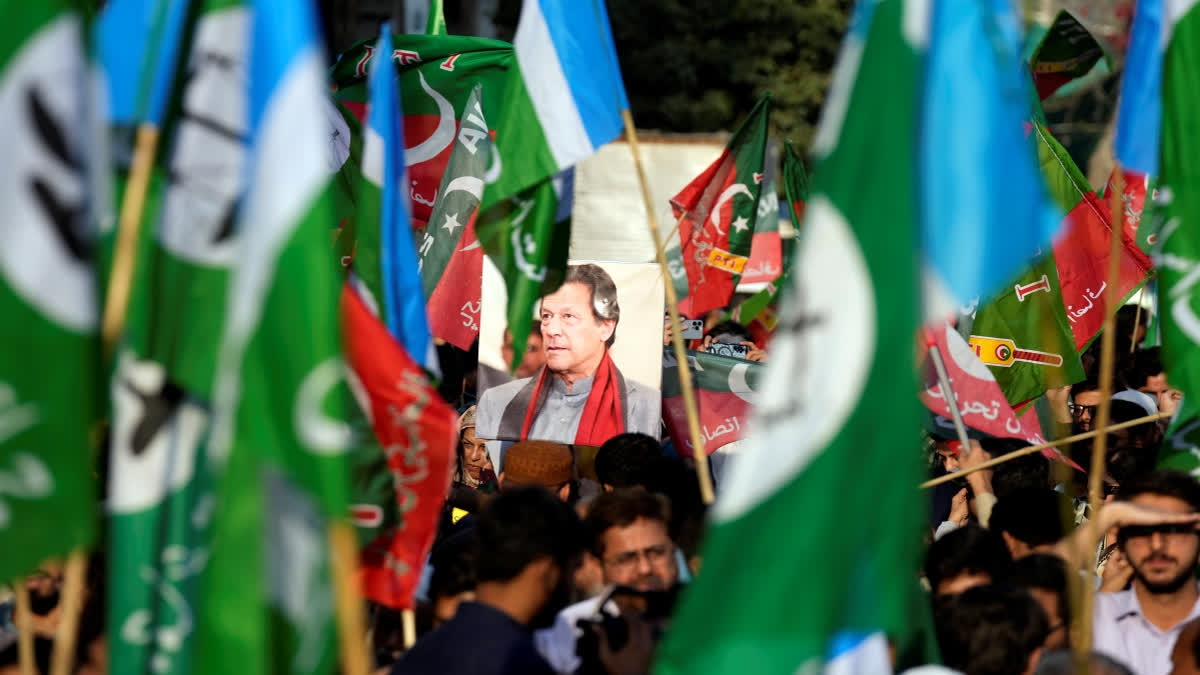Pakistan's general elections were expected to be a rigged farce, however, the results took everyone by surprise, especially those who thought they could manipulate democracy to their advantage.
In a brave rebuff, the voters first spotted and then backed independent candidates backed by Imran Khan’s Pakistan Tehreek Insaaf (PTI). This was despite the egregious attempts of the army-led establishment to prevent PTI from participating in the elections by jailing its leader, banning the party from contesting, taking away the symbol, and putting Imran Khan away in jail for 20 years in multiple cases.
Nothing worked it seems. Pakistan’s daily, The DAWN in Saturday's editorial castigated the army and said that “the powerful quarters should realise that meddling in civilian affairs is no longer acceptable to voters.” The army may have been taken aback by the rude shock of these results, but will seemingly do everything it takes to prevent the PTI-led independents from coming to power.
At the time of writing, PTI-backed independents had won 92 seats, far ahead of Pakistan Muslim League’s 71. Nawaz Sharif’s PML (N) and Pakistan’s People’s Party (PPP) have claimed majority and staked claim to form the government being the largest grouping in the assembly. There are also reports of horse trading with big money on offer to the independents that contested and won. As they fought on independent tickets, they are easy pickings by one of the two parties -- PML (N) and PPP.
Meanwhile, the international community has taken unkindly to the alleged rigged voting in Pakistan. Though PTI had accused the West of supporting Imran Khan’s ouster, the fact that US, UK. and EU have urged a probe into February 8 voting irregularities corroborates how horribly the elections were conducted in Pakistan.
Many media houses were critical of the Election Commission of Pakistan (ECP) taking so much time to declare results. There was also justifiable criticism of the internet and mobile telephony ban, which was used by ECP to rationalize the delay. Supporters of PTI claim otherwise. They assert that the delay in counting and declaration of results was used to push Nawaz Sharif’s PML(N) and PPP and allow them an undue advantage.
If there had been no intervention by the army, many of their candidates would have lost. Some of the results defy logic. At least in one seat, the votes counted were more than the votes polled. Similar bloopers were put on display in plenty on social media. However, the results have proved that no amount of manipulation by powerful groups can prevent the voters from expressing their wrath. What was also compelling was that voters could not be swayed by fear of the establishment. Imran Khan may have been a poor administrator, but he was seen to be a well-meaning person whose heart beat for Pakistan. Nawaz Sharif, or the Zardaris do not enjoy this reputation.
It is highly likely that there would be a coalition government between Nawaz Sharif and Bilawal-Zardari camp. Surely the army, euphemistically described as powerful quarters by the media, led by the current Chief of Army Staff, General Asim Munir, would back them, well aware that the large majority of those who voted in these elections was against them and the influence they exercised on civilian life.
The Pakistan army is bigger than the state in many ways and every politician has realized this to their mortification. On the national economy, the Pakistan army struggles to find a policy mix that will keep money bags, foreign investors and the disadvantaged happy, but that is not working. Before the elections, the army was keen that the civilian government should manage the economy in a manner where they could get an IMF loan so that the economy could scramble out of the deep abyss it was pushed into.
Due to the miserable state the Pakistan economy is in, its people are looking for a magic bullet to sort out the problem. Restoration of ties with India could be the beginning of sorting out this mess, but the BJP government in Delhi has shown no real interest in giving a lifeline to the beleaguered government in Islamabad.
On the contrary, it has done enough to rile it further through the abrogation of Article 370 as well as bringing in the Citizen Amendment Act (CAA). Though these policy moves should not concern Pakistan, they reinforce the impression that India does not want to pursue a policy of accommodation to ensure that Islamabad does not support any cross-border adventurism.
The only time India displayed some warmth was when the then Pakistan Prime Minister Nawaz Sharif arrived in India for Prime Minister Narendra Modi’s swearing-in ceremony in 2014. A year later, Modi had reciprocated by stopping by at Lahore to break bread. At that time, a breakthrough in ties seemed imminent, but compulsions of domestic politics prevented Modi from any big move.
The big question is if Nawaz Sharif becomes PM again, will Narendra Modi reach out to him to convey to the deeply suspicious Muslims of the Indian subcontinent that they can trust him to look after their interests and usher in a new age of peace in the region. In the past, Prime Minister Atal Behari Vajpayee had attempted to build bridges with Pakistan but was tripped. Since then, Indian Prime Ministers have been careful about initiating talks with the northern neighbour.
The return of Nawaz Sharif and the presence of a confident Indian PM in Narendra Modi could see the resumption of ties again between the two countries. If that happens then this would have major economic spinoffs for a cash-strapped Pakistan and electoral advantages for the BJP in India as it goes for the parliament polls. It could be a win-win for both sides if normalcy is restored at the border. Besides, it would also help in stabilizing one side of our border as it takes a hard look at China on the other side.
Read More



